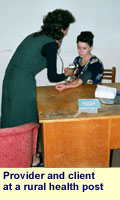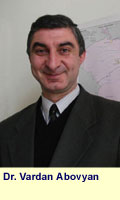
Expanding the Role of Nurses and Midwives
“Before PRIME II, we in the health system were not paying enough attention to the rural health posts. Now, we have begun to appreciate the important contributions that nurses and midwives at those facilities can make to improvements in the primary health care system.”
For Dr. Vardan Abovyan, a physician in a rural province of Armenia, the PRIME II Project’s focus on primary providers has brought new insight and energy into ways to increase the quality and accessibility of family planning and reproductive health care for underserved women.
Armenia’s health care system has experienced prolonged transition since the country’s independence from the Soviet Union in 1991. Delivery of health services remains oriented toward highly-specialized hospital-based care, and nurses and midwives at rural health posts are typically instructed to send pregnant women to higher-level facilities and refer family planning clients to obstetrician/gynecologists. Use of reproductive health services has declined, leading to delays in prenatal care, a rise in home births and a reported increase in maternal mortality.
To reverse these trends and address a general decline in the health of the population, the government of Armenia has launched an ambitious program to expand primary health care through the introduction of family medicine and more efficient service delivery mechanisms. The PRIME II Project has joined this effort, assisting the Ministry of Health to strengthen reproductive health services through policy development and performance improvement for primary providers.
A Ministry of Health technical working group supported by PRIME II developed a national policy framework in February 2002 that outlines the components of priority reproductive health services and recommends venues for those services. While not yet official policy, the framework establishes broader responsibilities for nurses and midwives at rural health posts including routine prenatal care.
Building on this framework, PRIME and the Ministry of Health hosted a two-day national forum in September 2002, bringing together more than 100 national and international experts from both the public and private sectors to address policy and programmatic actions that will improve the health of Armenia’s women and children. Participants found the interdisciplinary, participatory format of the meeting innovative for Armenia, creating new opportunities for broad dialogue on critical issues. Training nurses and midwives in family planning service provision emerged as one of the consensus recommendations from the forum.
PRIME II and the Ministry of Health are now using the national policy framework and national forum recommendations to plan interventions based on the Performance Improvement (PI) approach. A program blending self-directed learning and supervised clinical practica for nurses and midwives at 60 facilities in Lori Marz is designed to enable these primary providers to monitor healthy pregnant women, educate communities on the danger signs associated with pregnancy, and counsel postpartum women on the benefits of exclusive breastfeeding and the importance of family planning to avoid unwanted or mistimed pregnancies. A subset of midwives will undergo comprehensive training in normal labor and delivery.
“We see a vital role for nurses and midwives, particularly those who work independently in underserved areas, in expanding access to much needed prenatal care,” says Dr. Gayane Avagyan, an obstetrician/gynecologist and advisor to the Ministry of Health. “We know that nurses and midwives can offer a greater range of services given the appropriate training and support, and we are committed to enabling them to do so.”
The PRIME II Project works around the world to strengthen the performance of primary-care providers as they strive to improve family planning and reproductive health services in their communities.
PRIME Voices #16, Armenia: Expanding the Role of Nurses and Midwives, 1/21/03.
|












